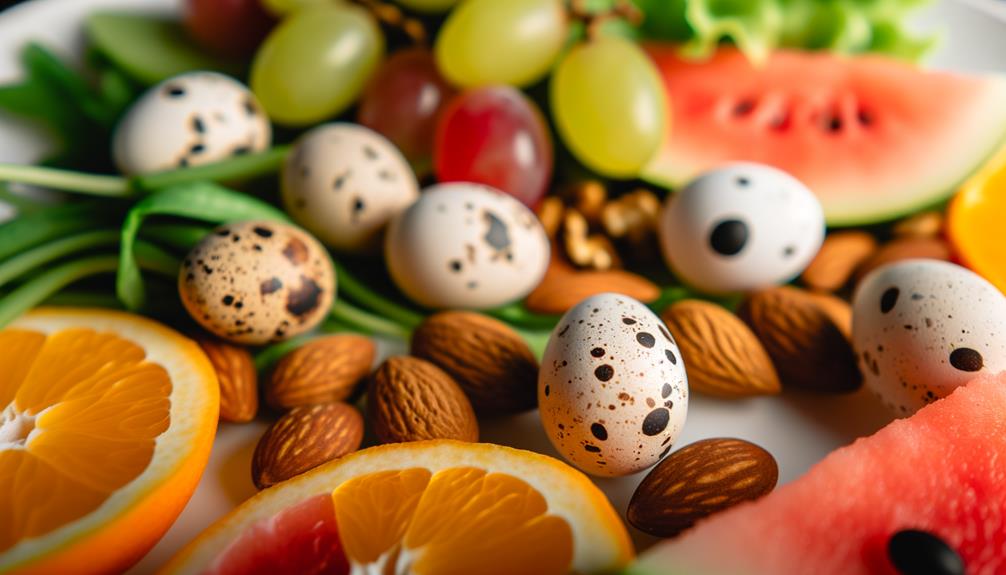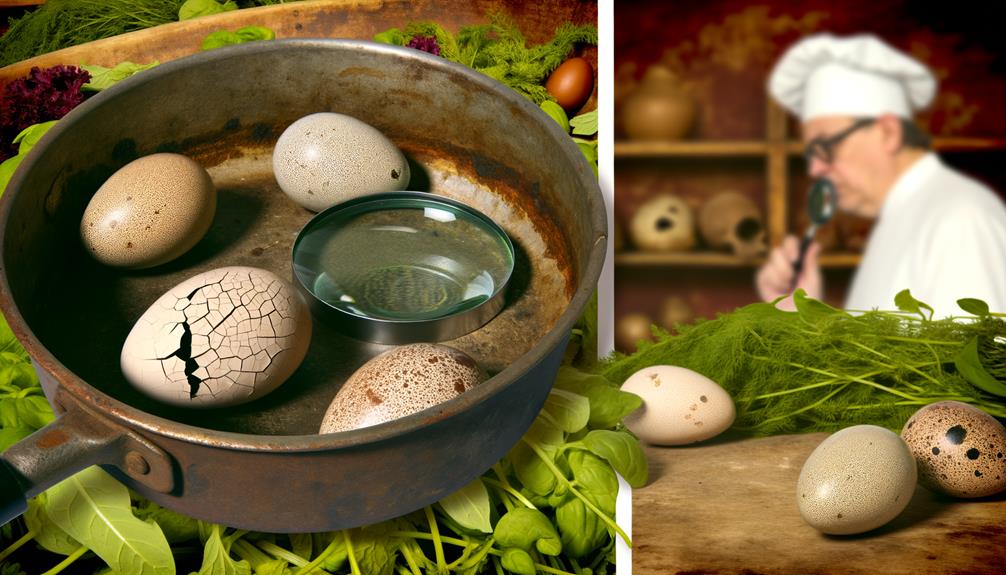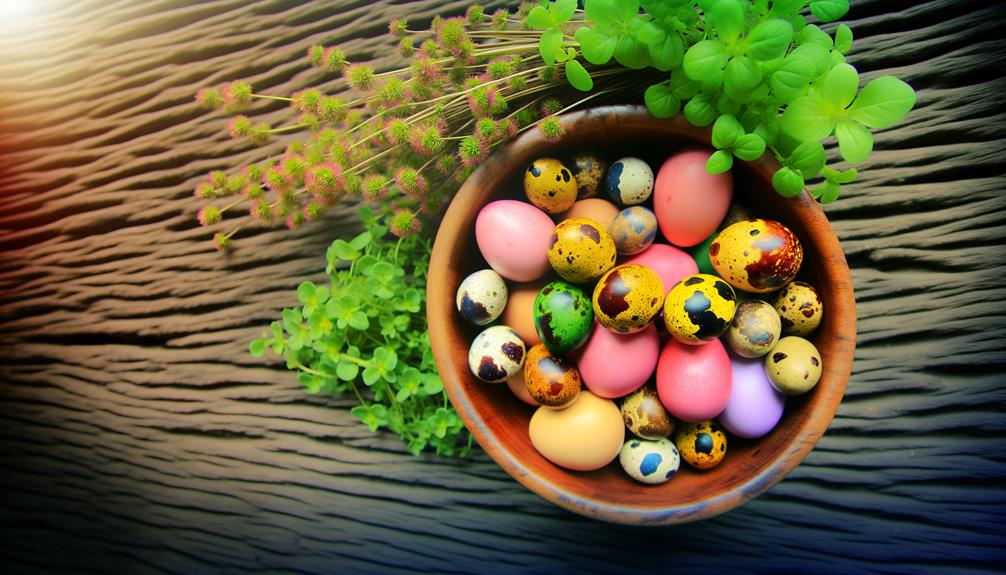How Can You Eat Sparrow Eggs?
Sparrow eggs are nutritionally rich, offering proteins, vitamins A, D, E, and B-complex, as well as essential minerals like calcium and iron. Despite their unique, gamey taste, consumption is not recommended.
Legal restrictions, such as the Migratory Bird Treaty Act, prohibit taking sparrow eggs without a permit. Ethically, harvesting these eggs disrupts ecological balance and can lead to population declines.
Additionally, sparrow eggs pose health risks, including potential pathogens and contaminants. Understanding the broader implications of sparrow egg consumption enhances informed decision-making on the topic.

Key Takeaways
- Consuming sparrow eggs is generally illegal due to wildlife protection laws.
- Sparrow eggs pose significant health risks from pathogens and contaminants.
- Harvesting sparrow eggs can disrupt ecosystems and reduce sparrow populations.
- Ethical concerns arise from the ecological impact of consuming sparrow eggs.
- Sustainable alternatives like quail and chicken eggs offer similar nutritional benefits.
Nutritional Value

Sparrow eggs provide a unique nutritional profile, rich in essential proteins, vitamins, and minerals that contribute to overall health. These eggs are particularly dense in high-quality proteins, containing all nine essential amino acids required for muscle repair and growth.
Additionally, sparrow eggs are a significant source of vitamins such as A, D, E, and B-complex vitamins, which play critical roles in vision, bone health, and metabolic processes. Mineral-wise, they boast notable concentrations of calcium, iron, and phosphorus, essential for bone density, oxygen transport, and cellular energy production.
Studies have demonstrated that the bioavailability of these nutrients in sparrow eggs is high, making them an efficient dietary inclusion for individuals seeking to enhance their nutritional intake with a compact, nutrient-rich food source.
Taste and Texture
Beyond their impressive nutritional profile, the organoleptic properties of sparrow eggs, including their taste and texture, offer a distinctive culinary experience that merits examination.
The taste of sparrow eggs is often described as more intense and gamey compared to conventional poultry eggs, which may be attributable to their unique diet.
Texturally, the albumen of sparrow eggs tends to be less viscous, providing a delicate mouthfeel. The yolk is notably rich and creamy, contributing to a more pronounced flavor profile.
Empirical evidence from culinary experimentation suggests that sparrow eggs can enhance the complexity of dishes, offering a nuanced taste dimension.
These attributes underscore the potential gastronomic value of sparrow eggs, inviting further exploration and appreciation in the culinary arts.
Legal Considerations

Exploring the legal terrain surrounding the consumption of sparrow eggs demands a thorough understanding of wildlife protection laws and conservation regulations.
In many jurisdictions, sparrows are protected under various national and international statutes, such as the Migratory Bird Treaty Act in the United States, which prohibits the taking, possessing, or trading of migratory birds, their nests, or eggs without a valid permit. Evidence suggests that the decline in sparrow populations due to habitat loss and climate change has led to stricter enforcement of these laws.
Violations can result in significant fines or imprisonment. Detailed observations indicate that any activity involving the collection of sparrow eggs must be carefully scrutinized to guarantee compliance with these legal frameworks, underscoring the importance of conservation efforts.
Ethical Concerns
The ethical implications of consuming sparrow eggs extend beyond legal concerns, encompassing worries about biodiversity preservation and the moral obligation of humans to protect vulnerable species. Sparrows play an important role in ecosystem balance, serving as pest control agents and pollinators. Harvesting their eggs disrupts reproductive cycles, potentially leading to population decline.
Evidence indicates that many sparrow species are already experiencing significant habitat loss and population decreases. Ethically, it is essential to take into account the long-term ecological repercussions of such actions. Additionally, the moral duty to conserve avian species aligns with broader conservation efforts aimed at sustaining biodiversity.
Therefore, consuming sparrow eggs can be seen as harmful both ecologically and ethically, warranting thoughtful reflection and adherence to conservation principles.
Health Risks

Consuming sparrow eggs poses several health risks, primarily due to potential exposure to pathogens and contaminants commonly found in wild avian populations. Pathogens such as Salmonella spp., Campylobacter spp., and avian influenza viruses can be present in these eggs, leading to foodborne illnesses.
Additionally, wild sparrows may ingest environmental contaminants, including heavy metals like lead and mercury, which can bioaccumulate in their eggs. The lack of standardized safety measures for wild-collected eggs further exacerbates these risks.
Evidence from avian biology studies indicates that eggshells of wild birds can harbor bacteria and parasites, posing additional health threats. Individuals consuming sparrow eggs are at a heightened risk of contracting zoonotic diseases and experiencing toxic exposure, necessitating caution and thorough risk assessment.
Culinary Uses
The culinary applications of sparrow eggs encompass a variety of traditional cooking methods, with historical records indicating their use in both Asian and European cuisines.
Nutritional analyses reveal that sparrow eggs offer a unique profile of essential amino acids, vitamins, and minerals, making them a nutrient-dense food source.
Additionally, contemporary gourmet recipes explore innovative ways to incorporate these eggs, highlighting their delicate flavor and versatility in haute cuisine.
Traditional Cooking Methods
Traditional culinary methods for preparing sparrow eggs often involve intricate techniques such as poaching, steaming, or baking to preserve their delicate texture and unique flavor. These methods are meticulously chosen to maintain the structural integrity and subtle taste profile of the eggs. In traditional Chinese cuisine, steaming is preferred for its ability to evenly cook without overexposure to heat. Poaching is another method where eggs are gently simmered in water, maintaining their tenderness.
| Method | Description |
|---|---|
| Poaching | Gently simmering eggs in water to retain their softness and delicate texture. |
| Steaming | Using steam to cook eggs evenly, preserving moisture and consistency. |
| Baking | Slow cooking in the oven to develop a firm texture while maintaining flavor. |
| Stir-frying | Quick cooking in a hot pan, often combined with other ingredients. |
Scientific observations suggest these methods optimize the culinary experience of sparrow eggs.
Nutritional Value Insights
While appreciating the intricate traditional cooking methods, it is equally important to examine the nutritional value of sparrow eggs, which are rich in essential amino acids, vitamins, and minerals, making them a valuable addition to various culinary applications.
Scientifically, sparrow eggs are a dense source of high-quality protein, essential for muscle repair and growth. They contain significant amounts of Vitamin B12, critical for neurological function, and Vitamin A, essential for vision and immune health. Additionally, they are a source of essential minerals such as calcium and phosphorus, crucial for bone health.
Empirical studies suggest their nutrient profile can rival that of commonly consumed avian eggs, thereby offering a nutritionally dense option for diverse culinary preparations.
Gourmet Recipe Ideas
Incorporating sparrow eggs into gourmet dishes allows chefs to explore innovative culinary creations that leverage their unique nutrient profile and delicate flavor. These eggs, characterized by a higher concentration of essential amino acids and micronutrients compared to conventional poultry eggs, present an intriguing ingredient for haute cuisine.
Chefs have utilized sparrow eggs in various applications, such as poaching them to maintain their creamy texture and subtly nutty flavor. Additionally, the eggs can be incorporated into refined custards or emulsified in delicate sauces, thereby enhancing both texture and nutritional value.
Evidence-based culinary techniques, such as sous-vide cooking, guarantee precise temperature control, preserving the eggs' structural integrity and nutritive properties. This approach fosters a sophisticated gastronomic experience.
Cultural Significance

The consumption of sparrow eggs has been documented historically across various cultures, serving both nutritional and symbolic roles.
In numerous societies, these eggs were integral to traditional dietary practices, reflecting regional availability and subsistence strategies.
Additionally, sparrow eggs have held symbolic meanings, often associated with fertility and renewal, as evidenced by their ceremonial use in certain cultural rituals globally.
Historical Dietary Practices
Historical records indicate that sparrow eggs have been consumed in various cultures for their nutritional value and symbolic significance in rituals and traditional practices. Detailed historical texts and archaeological findings reveal the integration of sparrow eggs into dietary regimes.
Evidence from various regions highlights the following:
- Ancient Egyptian tombs: Depictions of sparrow egg consumption.
- Chinese traditional medicine: Valued for their purported health benefits.
- Medieval European cuisine: Utilized in both common and noble diets.
- Indigenous American tribes: Incorporated into ceremonial feasts.
- Roman culinary records: Documenting sparrow eggs as a delicacy.
These observations underscore the multifaceted role of sparrow eggs in historical diets, reflecting a blend of nutritional pragmatism and cultural practices. The widespread use across different societies emphasizes their significance in human history.
Symbolic Meanings Globally
Various cultures have imbued sparrow eggs with rich symbolic meanings, often associating them with themes of fertility, renewal, and spiritual significance.
In traditional Chinese culture, sparrow eggs are considered a potent symbol of prosperity and good fortune, reflecting the bird's association with industriousness and adaptability.
In European folklore, these eggs often symbolize rebirth and new beginnings, paralleling the seasonal resurgence of nature.
Anthropological studies suggest that some Indigenous tribes in North America regard sparrow eggs as sacred, attributing to them a spiritual connection to life cycles and ancestral wisdom.
These symbolic interpretations are not merely anecdotal but are rooted in documented cultural practices and beliefs, reflecting the deep cultural resonance sparrow eggs hold across diverse societies.
Environmental Impact
Harvesting sparrow eggs for consumption poses significant risks to local ecosystems, potentially leading to declines in sparrow populations and disruptions in ecological balance. Sparrows serve critical roles in their habitats, including pest control and seed dispersal. Disrupting their reproductive cycle can have cascading effects on biodiversity.
Evidence indicates that sparrow population declines are linked to reduced availability of nesting sites and food sources. Further, removing eggs can exacerbate these trends and lead to:
- Loss of a natural pest control agent
- Reduced seed dispersal, affecting plant regeneration
- Increased vulnerability of sparrow predators due to food scarcity
- Habitat degradation from altered ecological dynamics
- Potential rise in insect-borne diseases due to fewer sparrows
Understanding these impacts is essential for informed decision-making.
Alternatives to Sparrow Eggs

Given the substantial environmental impacts of harvesting sparrow eggs, exploring sustainable and ecologically sound alternatives becomes crucial.
Quail eggs present a viable substitute, featuring similar nutritional profiles and culinary versatility. Evidence suggests that quail farming exerts less ecological strain compared to wild sparrow egg collection.
Additionally, chicken eggs remain a widely accessible and nutritionally robust option. Duck eggs, noted for their higher protein content and rich flavor, offer another sustainable alternative.
These choices not only alleviate pressure on wild bird populations but also ensure food safety and regulatory compliance. Implementing these substitutions can facilitate biodiversity conservation while providing equivalent nutritional benefits.
Therefore, promoting these alternatives is critical for ecological balance and sustainable consumption practices.
Conclusion
To wrap up, the consumption of sparrow eggs intertwines various dimensions: nutritional value, organoleptic properties, and legislative frameworks.
Ethical implications resonate with conservation imperatives, while health risks necessitate cautious consideration.
Culinary applications, although diverse, must be juxtaposed with cultural and environmental impacts.
Alternatives to sparrow eggs present a sustainable path forward.
Like a delicate balance, the decision to consume sparrow eggs hinges on a multifaceted evaluation of these interwoven factors, ensuring informed and responsible choices.






